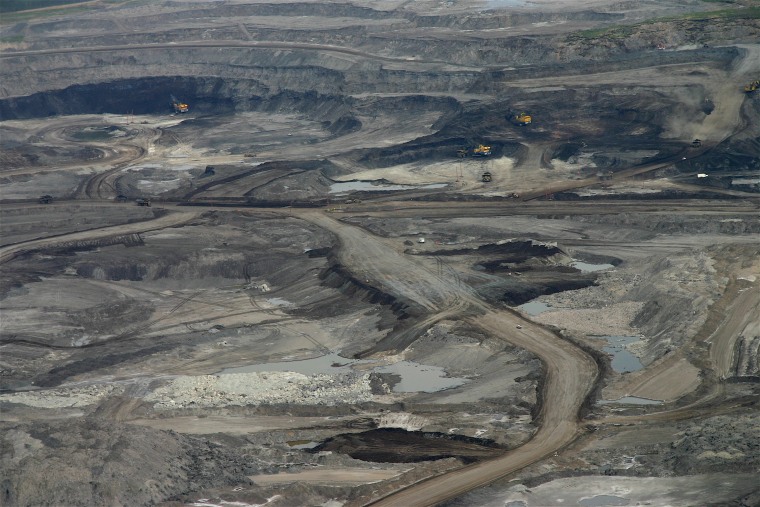President Barack Obama's first trip abroad on Thursday included a sticky topic: whether or not to encourage Canada to keep tapping its oil sands — a huge deposit that in Obama's view also has a huge carbon footprint.
"What we know is that oil sands creates a big carbon footprint. So the dilemma that Canada faces, the United States faces, and China and the entire world faces is how do we obtain the energy that we need to grow our economies in a way that is not rapidly accelerating climate change," Obama told the Canadian Broadcasting Corp. on Tuesday.
Canadian Prime Minister Stephen Harper has said energy security and the environmental impact of massive oil sands operations in Alberta province will be priorities during his meeting with Obama. Harper is expected to lobby Obama on the merits of the oil sands as a safe and secure source of oil.
But critics say the growing operations by major oil companies will increase greenhouse gas emissions and threaten Alberta's rivers and forests. Experts say producing a barrel of oil from sand results in emissions three times greater than a conventional barrel of oil.
Looking for carbon capture
Obama said he would like to work with Canada on developing carbon capture and storage to deal with the massive emissions coming out of both the American coal and Alberta oil industries. The new largely unproven technology would bury harmful emissions underground. The Obama administration dedicated billions from its economic stimulus package to renewable energy and new green technologies.
"I think to the extent that Canada and the United States can collaborate on ways that we can sequester carbon, capture greenhouse gases before they're emitted into the atmosphere, that's going to be good for everybody," Obama said.
Obama has criticized America's dependence on Middle East oil and has said he'll get serious about energy independence. The Bush administration viewed oil-rich Canada as a reliable source of energy that will help reduce reliance on Middle East oil.
Canada has warned Washington would lose energy security if it doesn't take Alberta's oil. Daily production of 1.2 million barrels from the oil sands is expected to nearly triple to 3.3 million barrels in 2020.
Industry officials estimate northern Alberta could yield as much as 175 billion barrels of oil, which would make Canada second only to Saudi Arabia in crude oil reserves.
Company charged in duck deaths
Obama's trip comes a week after a major Canadian oil sands company was charged with violating environmental laws after several hundred ducks died in a toxic pond last spring.
Images of the dead and dying ducks received international attention and Harper remarked that that reputation of Canada's massive oil sands projects had been harmed.
Syncrude Canada Ltd. was charged with failing to take action that might have kept some 500 ducks from dying last April in a tailings pond which contained waste made from the separation of oil from sand.
Syncrude officials said at the time that noisemakers used to scare waterfowl away from the lake-sized tailings pond had not been deployed because of a spring snowstorm.
Alberta Environment Minister Rob Renner said its the first time the charges have been laid in Alberta. He said it will be a joint prosecution with the federal government.
More toxic ponds
Dozens of tailings ponds have been building up over 40 years in northern Alberta, but an action plan announced recently aims to force companies to clean up the sludge over several decades.
Environmental groups say this go-slow approach will do little in the short term to reduce the size of the toxic ponds, which are so large they can been seen from space.
Greenpeace activist Mike Hudema called the maximum fines under this prosecution as very weak, given the huge profits the company has reaped in recent years.
The charges under Alberta's Environmental Protection Act carry a maximum penalty of $410,000. Environment Canada, a federal agency, has charged Syncrude under the Migratory Birds Convention Act. The maximum penalty is $240,000.
